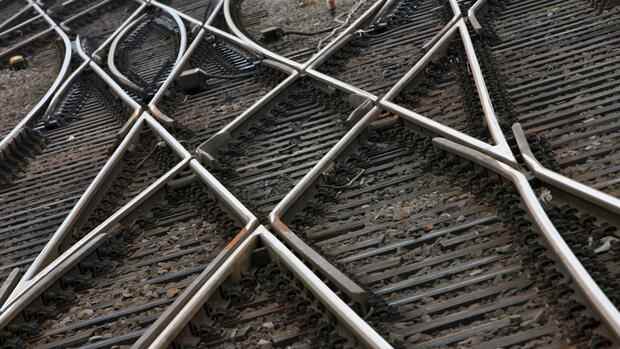The rail cartel has agreed on prices for many years in the past.
(Photo: dpa)
Dusseldorf Deutsche Bahn suffered a bitter defeat in its trials against the so-called “rail friends”. The Frankfurt district court rejected a claim for damages by the group against the Czech steel company Moravia.
It is undisputed that Moravia, together with Thyssen-Krupp, Voestalpine and other companies, has agreed on the prices for rails for years. However, the railways ignored findings about the cartel “grossly negligently”, as the court ruled.
In plain language, this means that the railways might have had knowledge of the agreements. The judgment has far-reaching consequences for the state-owned company. The regional court saw the claim for damages of around 350 million euros as inadmissible, as the judgment shows. The document is available to the Handelsblatt. The railway announced an appeal.
The illegal association of steel companies, whose members called themselves “rail friends”, had already been broken up by the Federal Cartel Office in 2011. This was preceded by a voluntary disclosure by the Austrian manufacturer Voestalpine, in which the company had unpacked the conduct of the cartel participants.
Top jobs of the day
Find the best jobs now and
be notified by email.
After the price agreement to the brothel
What the officials heard surprised even the experienced investigators. The members of the cartel called themselves “Domina”, “Hannibal Lecter” or “the little brother”, and they agreed prices and delivery quantities at regular meetings down to the cent and tonne. Then it was off to the finest brothels in the country, as those involved reported to the Handelsblatt at the time.
The hustle and bustle came to an end when the Cartel Office intervened. After completing its investigation, the authority imposed high fines on the companies. The railways, as the main victims, then saddled their claims for damages. According to Deutsche Bahn documents, the amount of damage in the years 2001 to 2011 added up to around one billion euros, and it may be even higher. The state of Germany is primarily affected, as it will cover the costs for the rails from tax revenue.
Deutsche Bahn has already received more than 200 million euros in damages from Thyssen-Krupp, Voestalpine and Vossloh. Part of the total damage could thus be settled. However, the damage will certainly never be completely compensated for. Experienced steel managers reported that the rail cartel’s origins date back to the 1950s. Over the decades, the financial damage for the Federal Republic is likely to be well over the one billion euro mark.
The core of the cartel has remained essentially the same over the years, although some smaller manufacturers and rail dealers have ceased operations. Their shares were then distributed among the other member companies. The Czech steel company Moravia, which had been brought on board by the leading companies Thyssen-Krupp and Voestalpine in order to make the offer appear more international, also benefited from this.
While Thyssen-Krupp and Voestalpine paid damages, Moravia rejected a comparison with the railways, which is one of the reasons why the proceedings in Frankfurt have been dragging on for more than ten years. The Czechs have now had success with their tough course, albeit over a legal crutch. The group admits that it was involved in the illegal agreements, but the railways could have prevented the cartel, Moravia argues.
Internal notices possibly ignored
Michael Kremer from the law firm Clifford Chance defended Moravia in the proceedings before the district court. He sees his view confirmed: The railways would have closed their eyes to the anti-trust agreements, Kremer told the Handelsblatt. There were internal indications of the cartel.
The district court followed this view in its judgment. A procedure that was negotiated in Frankfurt in 2001 is decisive here. The chief salesman at Thyssen-Krupp and the Deutsche Bahn buyers had to answer for cheating on rails in court. The judges ruled that their illegal activities should have made those responsible at the railway more vigilant.
The delivery quantities determined at that time did in fact remain identical up to 2011, as documents from the railways and the cartel companies show. The fact that some players stayed in their posts should have had an impact on the railways. The head of the legal department at the time was already involved in the 2001 proceedings. One of the prosecutors involved in the investigation even switched to Deutsche Bahn as chief investigator.
Against this background, the Frankfurt Regional Court ascribes a certain complicity to the railways for the continued existence of the cartel; their ignorance of the doings of the “rail friends” is just “grossly negligent”.
The railway does not want to follow the judge’s decision: “Due to serious errors in the facts and in the legal assessment, we will appeal the verdict,” said a spokeswoman. The group could not have acted with gross negligence or have knowledge of the cartel, since the rail cartel was only uncovered by the authorities in 2011. The railways had no knowledge of this beforehand.
More: Rush on IC and ICE overwhelms the train
